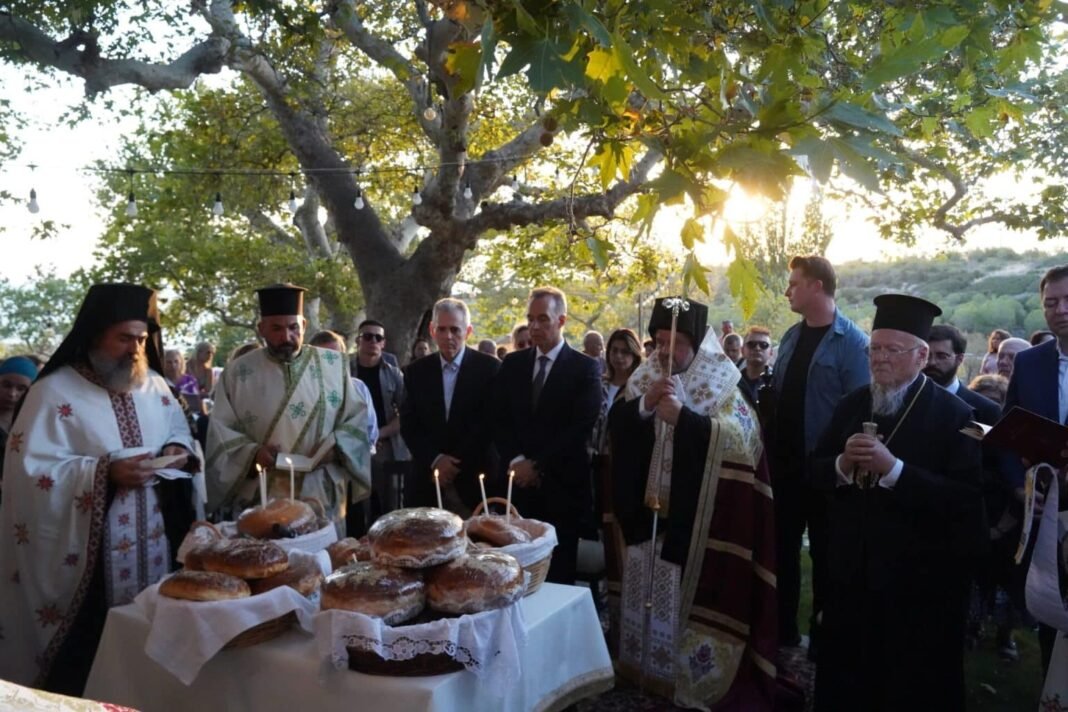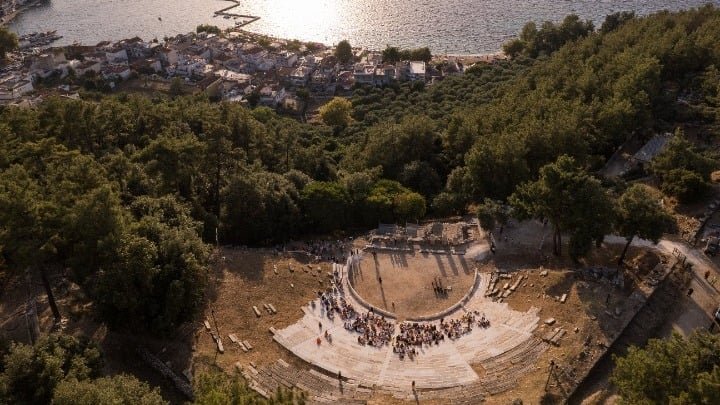
Tenedos, known as Bozcaada in Turkish, holds a significant place in Greek history, despite the dramatic reduction in its Greek population over the past decades. The island recently reaffirmed its enduring Greek heritage by celebrating its patron saint, Agia Paraskevi, on Saturday, July 26.
The Ecumenical Patriarch Bartholomew, a native of the nearby island of Imbros, presided over the Divine Liturgy at the historic Church of the Holy Baptism of Agia Paraskevi.
In his address to the large congregation, His Holiness emphasized the importance of saints and martyrs to the Church’s identity and mission.
“We came to Tenedos to venerate her all-holy icon and to ask the Saint to protect the island and its inhabitants, the friends of Tenedos, all of you pious pilgrims and your loved ones,” he stated. He specifically lauded Agia Paraskevi, whose life he described as “a model of total and unconditional dedication to the Savior Christ and His grace,” and noted that July is dedicated to Holy Women.
Enduring trials and renewed hope for the Tenedos Greeks
The Patriarch also spoke movingly about the hardships faced by the Greek communities of Imbros and Tenedos, particularly after “the dark 1964.”
This year marked the implementation of the “Dissolution Program,” which led to the closure of Greek schools, economic hardship, and widespread insecurity.
“Very few of our people remained on the two islands, who, patiently and heroically, kept open here in Tenedos the gates of the Church of the Assumption of the Virgin Mary, of Agia Paraskevi and of all our exochurches that remained intact,” the Patriarch recounted. He strongly condemned the program, stating, “For a State to destroy its own citizens is unacceptable,” and expressed shame for its initiators.
Despite these trials, the Patriarch highlighted the unwavering faith and resilience of the Greeks who remained.
“Their hope did not fade, because they had unwavering trust in God’s providence and in their patron Saint Paraskevi. They saved our language and our traditions, and their existence was a call to the exiled Tenedos not to forget their small homeland,” he proclaimed. Their poignant message echoed: “If you forget us, who else will remember us?”
Today, there are “auspicious signs” for Tenedos. The island’s historic Church has been renovated and was inaugurated on the same day. There are positive prospects for an increase in the number of Greeks returning to the island.
Furthermore, the annual festival of Agia Paraskevi serves as a powerful invitation and message to the global Tenedian diaspora, reminding them that the island and their compatriots await their return.

When Turkey banned the teaching of Greek on Tenedos and Imbros
July 1 marks the anniversary of the day Turkey banned the teaching of the Greek language on the islands of Imbros and Tenedos (now Gökçeada and Bozcaada in Turkish), both of which have been Greek since ancient times.
Yet, after the rise of Turkish nationalism and the persecution of Greeks in the mid-1950s, on 1 July 1964, the then Turkish government prohibited the teaching of Greek on the two islands.
The two Aegean islands were Greek since ancient times, as Imbros belonged to the Athenian Alliance and on Tenedos, there was a temple of Apollo. However, after the fall of the Byzantine Empire, the two Aegean islands were claimed by the Ottomans and the Venetians, primarily due to their strategic position, as they were both very close to the entrance of the Dardanelles Strait, which leads to the Marmara Sea.
At the time of World War I, on Imbros, there were 8,000 Greeks, and on Tenedos nearly 3,000. Until 1920, they belonged to the Ottoman Empire. After Turkey and Germany lost the war, the 1920 Treaty of Sevres saw the two islands granted to Greece, an event that was greeted with enthusiasm by their inhabitants.
However, the joy lasted only two years. After the Asia Minor campaign catastrophe and the defeat of the Greek army, the Treaty of Lausanne granted the islands to Turkey.
Related: Greeks Reclaim Imbros: A Journey Home


